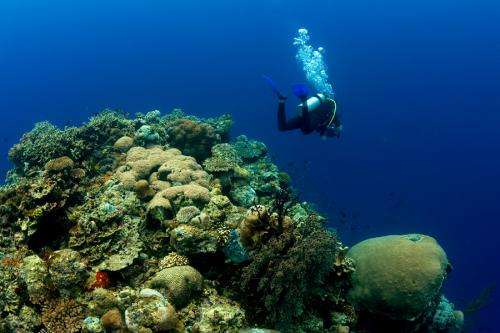Uncovering the climate gases that control our tropical coasts

For most people it's the characteristic smell of the sea, but for marine biologists dimethyl sulphide (DMS) and similar compounds play a key role in cloud formation and can be used by predators to locate prey.
Now new research from an international team of scientists reveals that these compounds, known collectively as Biogenic Volatile Organic Compounds or BVOCs, could well determine how our changing planet impacts tropical marine ecosystems, some of the most sensitive, yet productive, regions on earth.
"Organisms associated with tropical coasts, such as corals, are the highest producers of BVOCs on the planet. Decades of research from other environments would therefore suggest a critical role for BVOCs," says Dr Dan Exton, Marine Research and Operations Manager with Operation Wallacea and lead author of the study published this month in Global Change Biology.
"However, despite supporting at least half a billion people worldwide, we actually know very little about many of the processes that will determine how our changing planet impacts coral reefs," he says.
The team used existing, as well as previously unpublished data to consider how current environmental conditions shape the production of these fundamentally important climate gases across tropical coastal marine ecosystems. The results of the study reveal that the role these ecosystems play as global production hotspots of BVOCs has been almost entirely neglected.
"Our study takes this wealth of knowledge and applies it to the many unknowns regarding the functioning of key coral reef processes, addressing issues such as coral bleaching, how the multitude of species interact with one another, and how predicted future changes in reef communities will impact the production of these chemicals and the benefits they bring," he says.
Co-author Associate Professor David Suggett, Team Leader in the UTS Coral Ecophysiology Processes Group, says the research highlights the severe lack in our current understanding about the interplay between the ecological, physiological and climatic roles of BVOCs in regions most at risk from climate change and environmental degradation.
"Tropical coastal areas are highly productive and biodiverse, but changing rapidly. We simply don't have enough information to estimate current BVOC production let alone predict future emissions," says Associate Professor Suggett, an ARC Future Fellow in The Plant Functional Biology and Climate Change Cluster.
"The conceptual framework we are proposing is that BVOCs are the keystone that links these fundamental roles together. These gases sculpt communities and how these ecosystems 'talk' to climate. The challenge for us now is to prove how the framework operates," he says.
Dr Exton says that a particularly intriguing line of investigation focuses on the prospect that these chemicals could act as buffers against the impacts of increased environmental stress.
"We know that production rates increase under stress conditions, and that these chemicals stimulate cloud formation, and thus nature could have a very useful weapon up her sleeve to help shade reefs as climate change progresses. However, other evidence points towards a positive feedback scenario where production could in fact decline above a threshold point, which would be very bad news indeed."
The team hopes that future research will test their approach by identifying and quantifying the nature of BVOC production within tropical marine ecosystems, from mangroves to coral reefs, and result in predictive models using data generated from the molecular to remotely sensed scale.
More information: "Uncovering the volatile nature of tropical coastal marine ecosystems in a changing world." Global Change Biology. doi: 10.1111/gcb.12764
Journal information: Global Change Biology
Provided by University of Technology, Sydney





















